-
 Published: May 6, 2024
Published: May 6, 2024
-
 8 min. read
8 min. read
-
 Abbey Stephan
Abbey Stephan Lead Editor
Lead Editor
- Abbey is a digital marketer, copywriter, and lead editor. She has worked on over 200 client campaigns and WebFX, and she specializes in marketing strategy analysis and industry-specific digital marketing plans. Outside of writing and editing, you’ll likely find her taking pictures of her cat, making a new playlist, or tending to her houseplants.
What Is Keyword Clustering?
Keyword clustering is the process of grouping keywords based on search intent.
If you know anything about keyword research, you know how important it is to find and target keywords to create content across your site. You also probably find connected keywords to target as many users as possible on one page.
That’s where keyword clustering comes into play. If you have a built-out keyword strategy, you might even do keyword clustering without realizing it!
So, what is keyword clustering? Why does it matter for your search engine optimization (SEO) content?
Learn all the ins and outs of keyword clustering here:
- What is keyword clustering?
- Keyword clustering example
- Does content keyword help SEO?
- How to do keyword clustering
Read on to learn more! And, if you want more marketing tips for free, subscribe to our newsletter today!
Don’t miss our Marketing Manager Insider emails!
Join 200K smart marketers for the hottest marketing news and insights in your inbox.
Inline Subscription Form
“*” indicates required fields


What is keyword clustering?
Keyword clustering is the process of grouping keywords based on search intent.
Keyword clustering example
Consider how people search when they want to find something. They don’t all use the same exact phrase — they dance around a few terms for Google to nail down the perfect option.
For example, someone searching for “chocolate chip cookie dough recipe” and “chocolate chip cookie recipe” is looking for the same thing. Here’s what the first set of results looks like:

Those search engine results pages (SERPs) are practically identical to these:
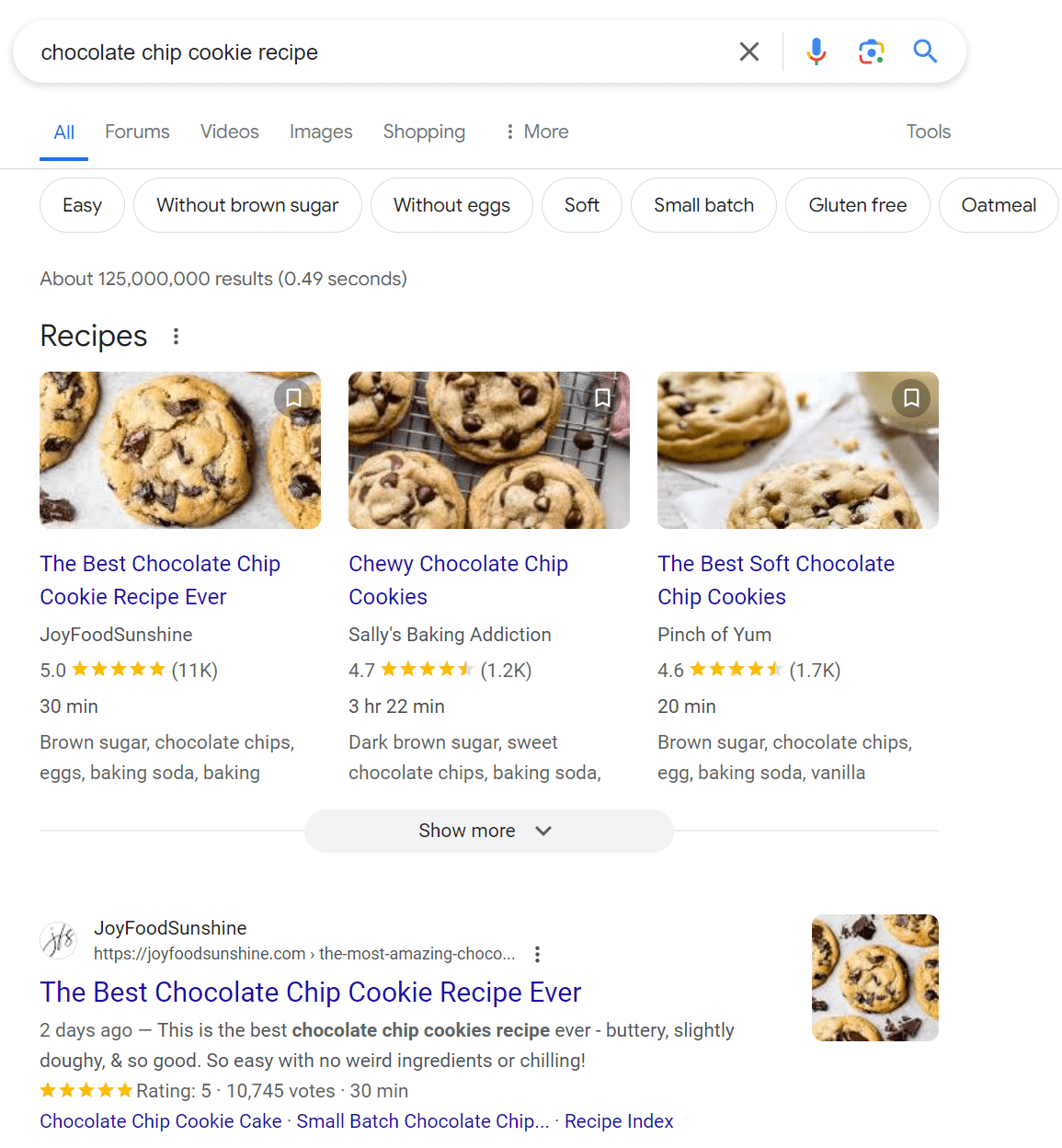
So, to effectively target all users, your keyword cluster should include both terms.
Does keyword clustering help SEO?
Yes! Absolutely!
As we talked about before, users search for pages with lots of different terms. So, targeting multiple keywords gives your page a better chance at ranking in the SERPs.
Keyword grouping also helps you:
- Explore new ideas: When you create a page outline, you likely know what you want to say before you write. However, doing quality keyword research and finding keyword clusters can help you find more topics you might not have considered. If all the leading pages address certain questions, you should, too.
- Reach new SEO target areas: You might find some keywords are not as effective for SEO because of their search volume. But with keyword clustering, you can target more of these low-volume keywords and add more value to your page.
- Improve your content quality: Keyword grouping helps you create better content. Adding more key terms means you understand what people are searching for (and can provide it). Since we create content for people, not just search engines, you want to be as thorough and helpful as possible.
How to do keyword clustering
Here’s how you can do keyword clustering and expand your web content:
1. Create a list of keywords
Step one of any keyword strategy is to find the keywords you want to use. If you use a tool like Ahrefs or KeywordsFX for keyword research, it makes this process easier.
Use our proprietary keyword research tool, KeywordsFX, to help you find high-quality keywords for content and PPC campaigns.
Identify Top Keywords for Free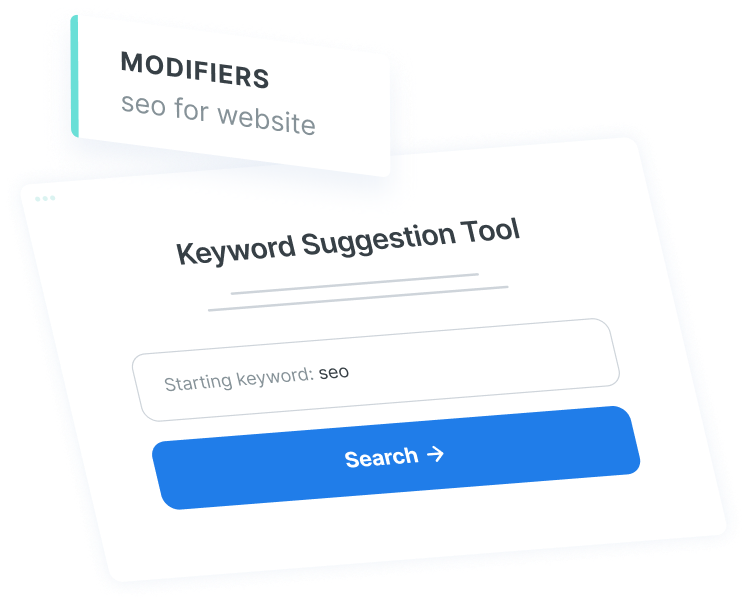

Keyword tools
If you have a starting keyword, you can use their keyword analysis tool to find additional keywords to target in your cluster. For example, if your keyword is “best airplane luggage,” you can enter that into the tool and select your search engine:
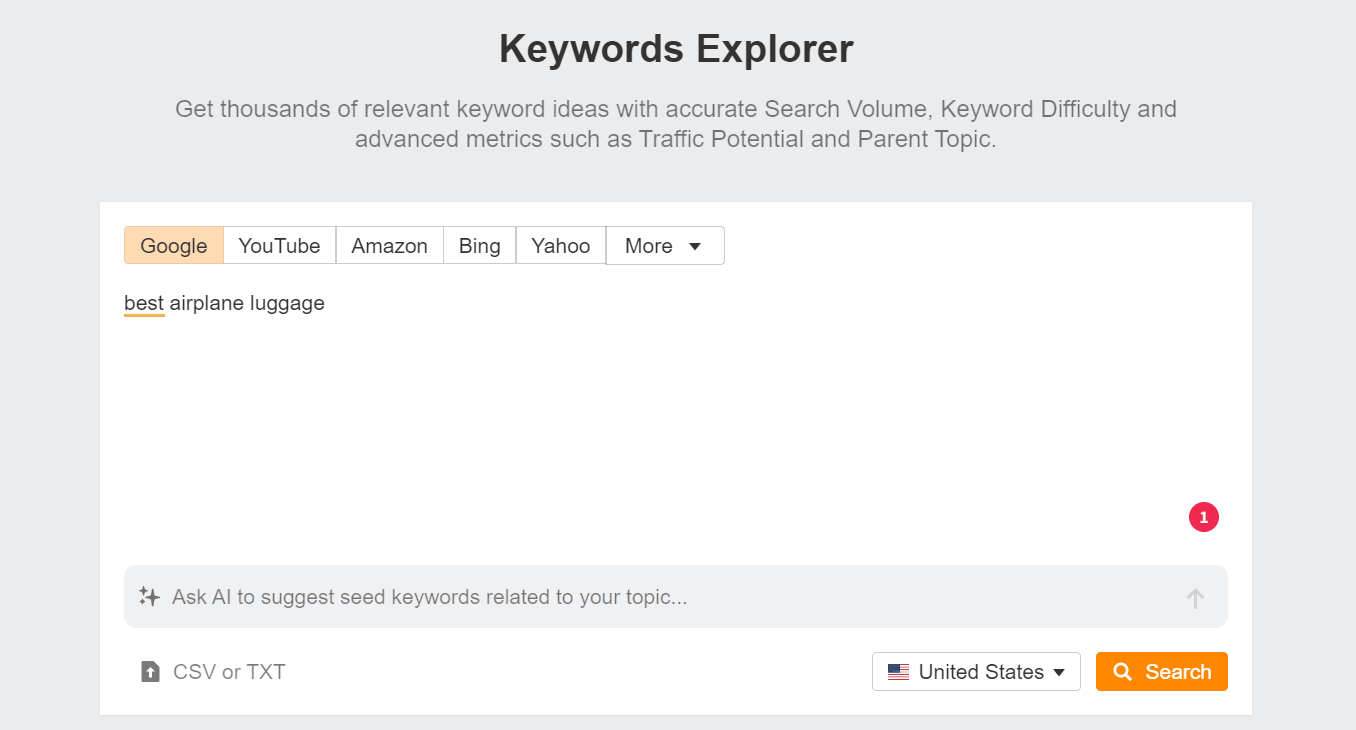
From there, you’ll get an overview of the keyword metrics, including density, ranking difficulty, and (most importantly) recommended keywords to target.

In this case, you could also target “best airplane carry-on luggage” and “best luggage for airplane travel.”
Competitor analysis
Another part of finding keywords is doing competitor analysis on top-ranking pages. You can look at what is currently ranking to find related terms.
If you enter the URL into Ahrefs’ Site Explorer, you can see what terms the top-ranking pages use. Clicking “Position” on the results page will order the positions from highest to lowest:
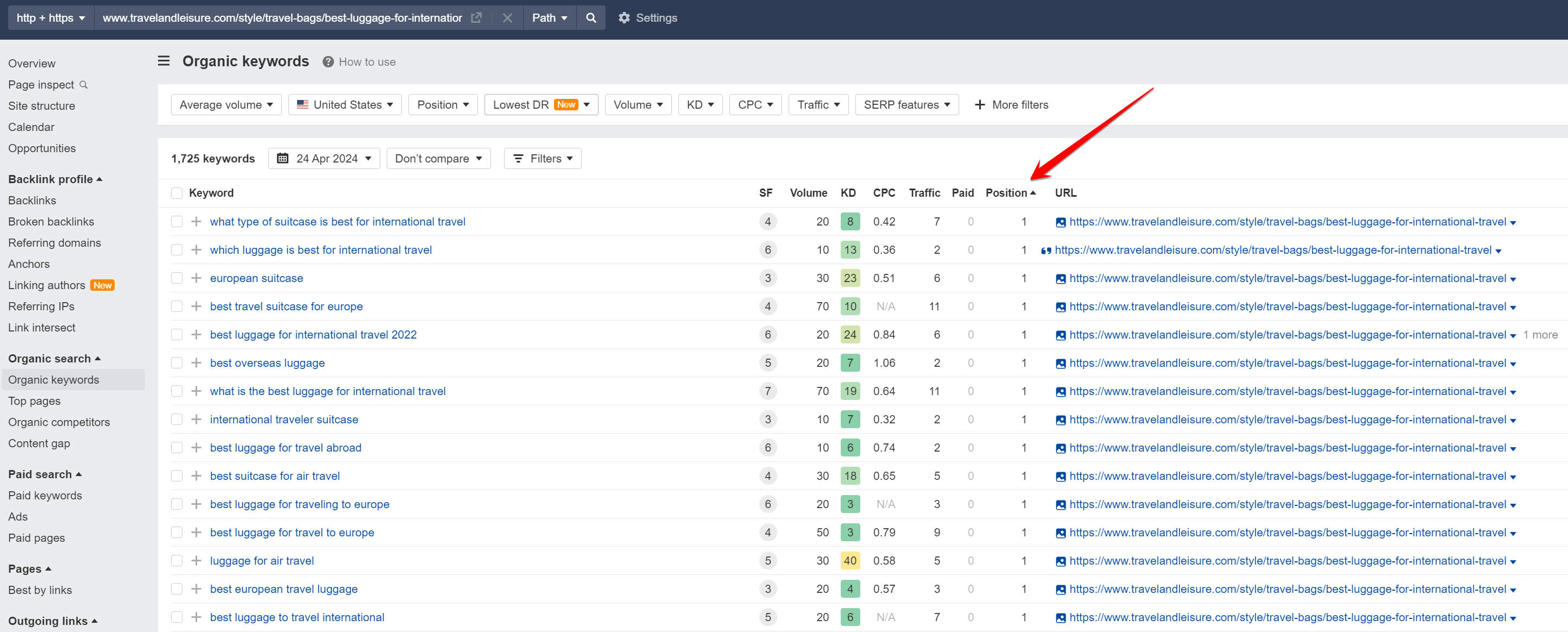
From here, you can create a list of keywords that you know drive results in the SERPs.
Google SERPs
Finally, if you want another way to find keyword clusters, look at the terms, outlines, and topics on pages ranking well in the SERPs. A quick Google search and skim will give you an idea of what topics you should cover to land on the first page.
For example, a sample outline for “best airplane luggage” might be:
- 10 of the best luggage options
- What to consider when picking luggage
- Requirements for different airlines/destinations
2. Sort your keywords
Now that you have a lengthy list of keywords, you can sort them into groups. The most standard groupings are:
- Informational: Looking for information
- Navigational: Looking for a specific website
- Commercial: Looking for information before making a purchase
- Transactional: Looking to complete a purchase
Look at the SERPs for each keyword to see where your keywords naturally fall. Even if the keywords are similar, each one will have a particular intent.
For example, the SERPs for “best running shoes” show a more informational intent, with several articles ranking and discussing running shoe options:
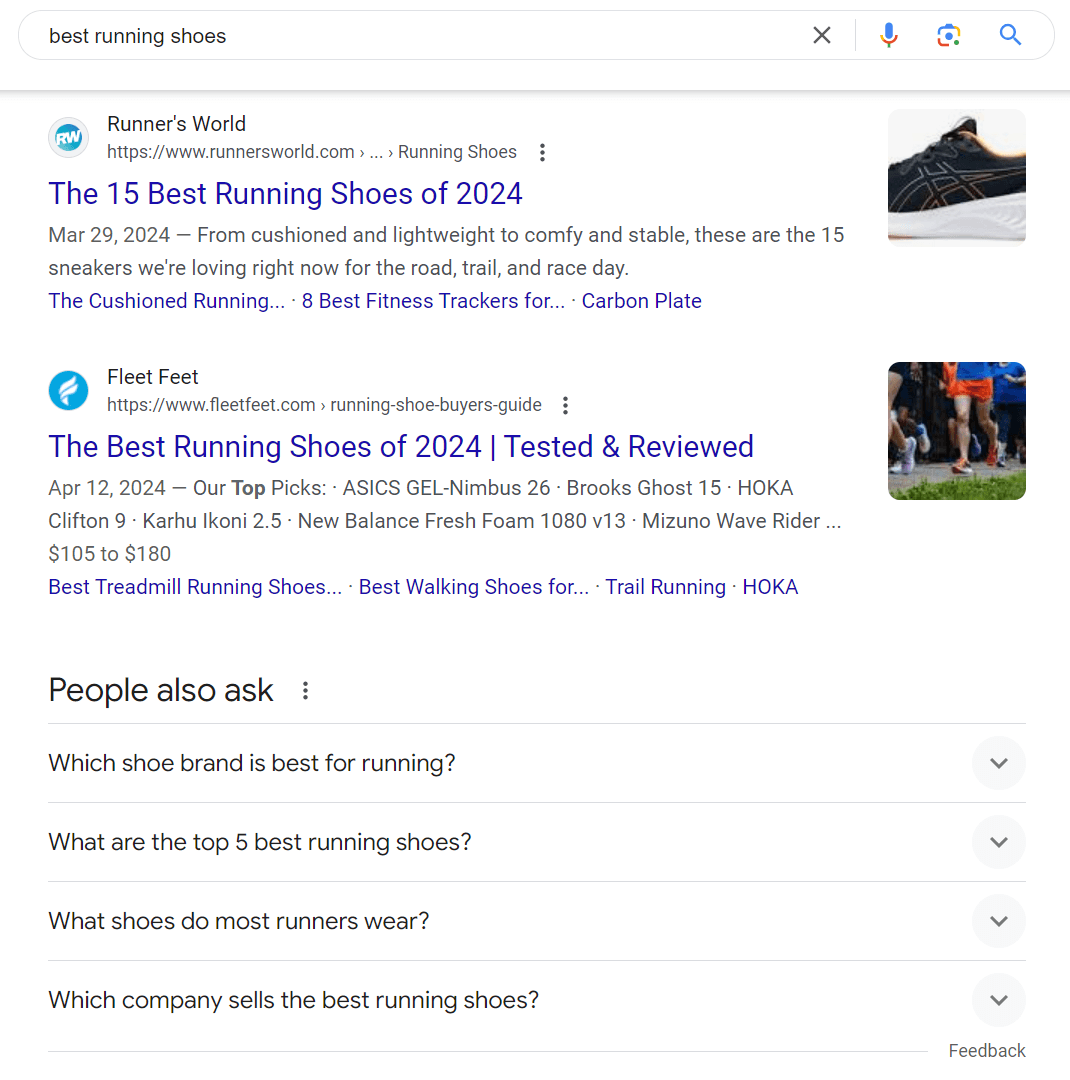
However, the term “running shoes” is more transactional or commercial since more of the pages are direct links to buy running shoes:
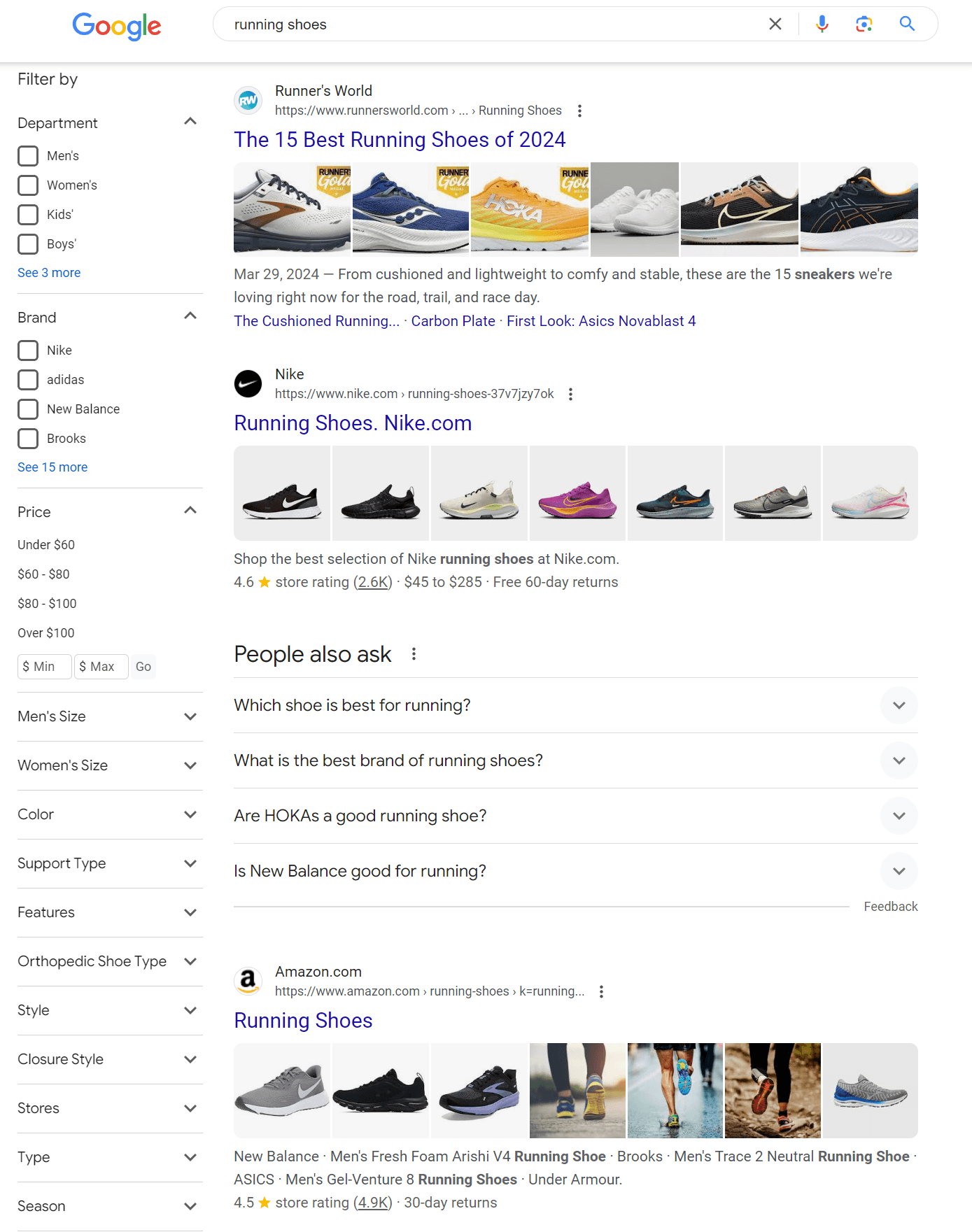
It can be hard to determine what words to group together and add to a page. In that case, consider the SERPs more carefully. Are the same pages ranking for different keywords? Then, those keywords go together.
Also, think about how much content you can create for each term. In some cases, it’s harder to create two fleshed-out pages over one. If the pages would be too thin alone, combine them. If someone would read about two topics together, you can combine topics then, too.
3. Plan your strategy
Now that you have a list of different keyword clusters, you should select a target keyword for each group. To do so, check the keyword density and difficulty in a tool like Ahrefs, SEMrush, or something else. You want to find the sweet spot of a high enough volume without being too difficult.
You might have to pick one with a low volume, just because it will be easier to rank for. The rest of the keywords in that cluster will be secondary options.
You can either start creating pages by content cluster or see if you already have a page that you could re-optimize. Outline a strategy mixed with writing and reworking to launch pages across your site. Building out your topic clusters with your keywords will help you stay organized while planning.
You can then start working through the pages and launching your new content!
4. Track your keyword rankings
Once your pages and changes go live, you should monitor your keyword clustering strategy to ensure its effectiveness. If you don’t notice any changes or your pages rank lower than you want, you can rework your keywords, content, and strategy.
Creating a schedule for content maintenance can make this process easier and ensure you don’t neglect any of your pages.
Our digital marketing campaigns impact the metrics that improve your bottom line.
See Our Approach
$10 billion

24 million

7.14 million
Want to up your keyword clustering game?
Now that you know the what’s what of keyword clustering, you can start implementing it into your content strategy. If you want to find the right keywords and create conversion-driving content, WebFX is here to help.
We have plenty of blog posts and resources for finding keywords and using them effectively. On top of that, our content marketing services let you take a more hands-off approach to adding impactful content to your site.
Want to learn more? Call us today at 888-601-5359 to chat with a strategist!
-
 Abbey is a digital marketer, copywriter, and lead editor. She has worked on over 200 client campaigns and WebFX, and she specializes in marketing strategy analysis and industry-specific digital marketing plans. Outside of writing and editing, you’ll likely find her taking pictures of her cat, making a new playlist, or tending to her houseplants.
Abbey is a digital marketer, copywriter, and lead editor. She has worked on over 200 client campaigns and WebFX, and she specializes in marketing strategy analysis and industry-specific digital marketing plans. Outside of writing and editing, you’ll likely find her taking pictures of her cat, making a new playlist, or tending to her houseplants. -

WebFX is a full-service marketing agency with 1,100+ client reviews and a 4.9-star rating on Clutch! Find out how our expert team and revenue-accelerating tech can drive results for you! Learn more
Try our free Marketing Calculator
Craft a tailored online marketing strategy! Utilize our free Internet marketing calculator for a custom plan based on your location, reach, timeframe, and budget.
Plan Your Marketing Budget

SEO Success with KOA

Proven Marketing Strategies
Try our free Marketing Calculator
Craft a tailored online marketing strategy! Utilize our free Internet marketing calculator for a custom plan based on your location, reach, timeframe, and budget.
Plan Your Marketing Budget
What to read next





